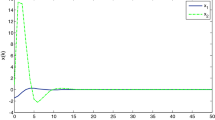Abstract
This paper considers the dynamic decoupling problem under state feedback control in singular systems. Control laws are suggested for a notion of strong decoupling which is characterized by the physical realizability of control laws and the lack of impulsive modes in closed-loop systems.
Similar content being viewed by others
References
Campbell, S. L.,Singular Systems of Differential Equations II, Pitman, New York, 1982.
Christodoulou, M. A., Decoupling in the design and synthesis of singular systems,Automatica,22 (1986), 245–250.
Cobb, J. D., Controllability, observability, and duality in singular systems,IEEE Trans. Automat. Control,29 (1984), 1076–1082.
Dai, L., Controllability, observability and system equivalence in singular systems,J. Graduate School, USTC, Academia Sinica,4 (1987), 42–50.
Dai, L., Impulsive modes and causality in singular systems,Internat. J. Control (1989), in press.
Falb, P. L., and W. A. Wolovich, Decoupling in the design and synthesis of multivariable control systems,IEEE Trans. Automat. Control,12 (1967), 651–659.
Fortman, T. E., and K. L. Hitz,An Introduction to Linear Control Systems, Marcel Dekker, New York, 1977.
Kailath, T.,Linear Systems, Prentice-Hall, Englewood Cliffs, NJ, 1980.
Lewis, F. L., Fundamental, reachability and observability matrices for discrete descriptor systems,IEEE Trans. Automat. Control,30 (1985), 502–505.
Lewis, F. L., A survey of linear singular systems,Circuits Systems Signal Process.,5 (1986), 3–36.
Mertzios, B. G., and M. A. Christodoulou, Decoupling and pole-zero assignment of singular systems with dynamic state feedback,Circuits Systems Signal Process.,5 (1986), 49–68.
Verghese, G. C., B. C. Levy, and T. Kailath, A generalized state-space for singular systems,IEEE Trans. Automat. Control,26 (1981), 811–831.
Wang, C., and L. Dai, Singular dynamic control systems—A survey,Control Theory Appl.,3 (1986), 2–12.
Wonham, W. M.,Linear Multivariable Control—A Geometric Approach, 2nd Edn., Springer-Verlag, New York, 1979.
Wonham, W. M., and A. S. Morse, Decoupling and pole assignment in linear systems: a geometric approach,SIAM J. Control Optim.,8 (1970), 1–18.
Yip, E. L., and E. F. Sincovec, Solvability, controllability, and observability of continuous descriptor systems,IEEE Trans. Automat. Control,26 (1981), 702–707.
Zhou, Z., M. A. Shayman, and T. J. Tarn, Singular systems: a new approach in the time domain,IEEE Trans. Automat. Control,32 (1987), 42–50.
Author information
Authors and Affiliations
Additional information
This project was supported by the National Natural Science Foundation of China.
Rights and permissions
About this article
Cite this article
Dai, L. Strong decoupling in singular systems. Math. Systems Theory 22, 275–289 (1989). https://doi.org/10.1007/BF02088303
Received:
Revised:
Issue Date:
DOI: https://doi.org/10.1007/BF02088303




